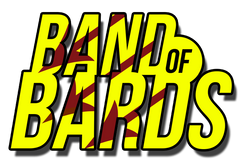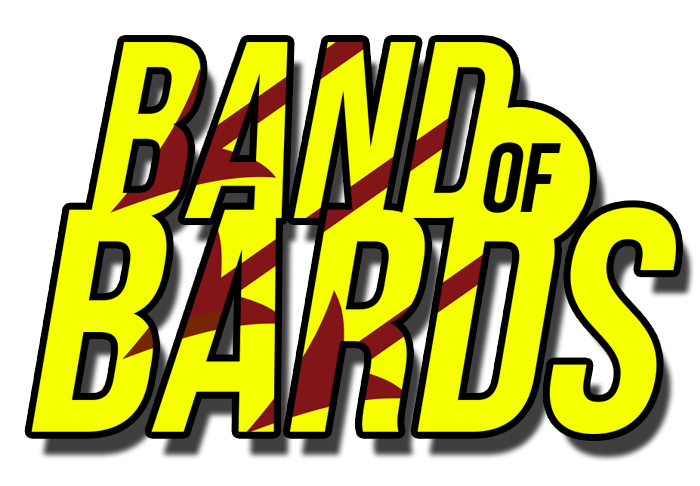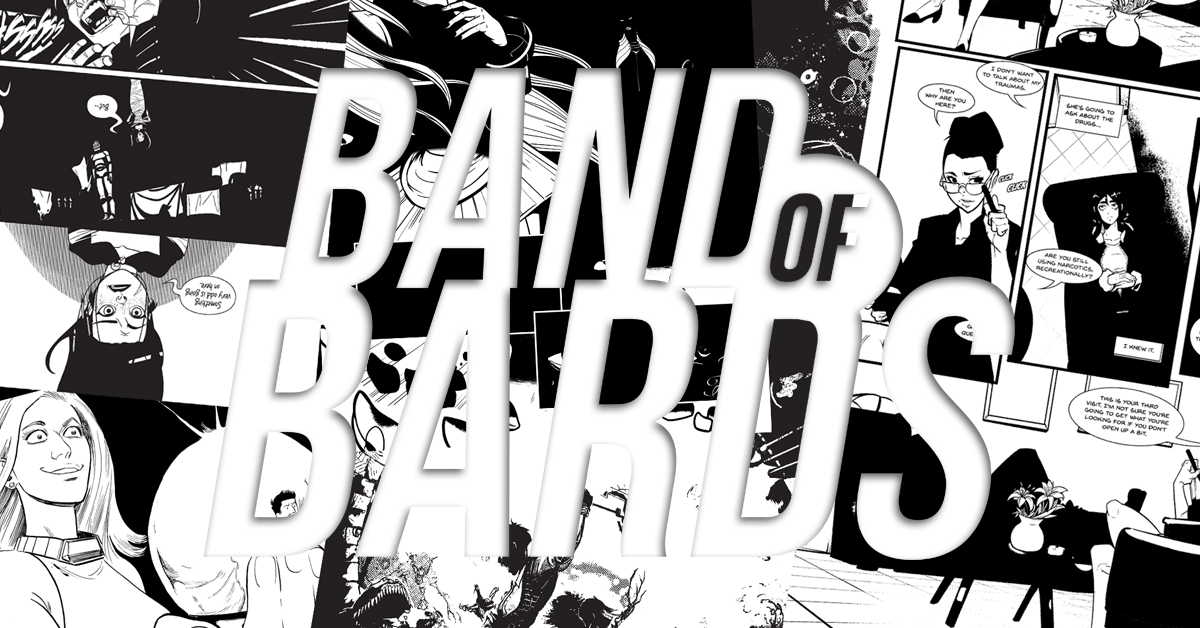Not many people.
You may not like it, but accept it. Oh yeah.
Now that I’ve hooked the wrestling fans let’s jump into the deep end with no floaties.
Comics have always been an outsider medium. This isn’t a history blog though, today we are focusing on the current state of the comics industry. What we have been seeing in comics mirrors what we see with music and movies. Lots of reboots, over saturation of well known IPs, lots of people crying for new stuff but then going right back to their tried & true fix.
Most people would say books (including comics!), movies, and music are entertainment. Too few think of these mediums as arts & culture. This has served to dilute the importance of the mediums resulting in people under valuing them. Streaming and instant access have ruined movies and music.
These are now commodities that we lease from big corporations rather than art that we purchase from the artists. Don’t believe me? Go talk to your local bands and the venues still hosting them. Every aspect has been turned into a rigged game feeding monopolistic giants that screw all of us every which way they can.
As for comics, the traditional model of the Direct Market (what a dopey term) of monthly periodicals churned out en mass with cover prices that rarely increase. One more industry where the largest publishers set de facto standards, leading to readers expecting every comic to follow suit. For comics we have the Big 2, Marvel & DC, controlling about 75% of the market. Add in Image and you have three publishers controlling 85% of the entire market. If you ever look at a breakdown of market share you’ll see that rounding out the Top 10 comic publishers are well known names that capture 2% - 3%, with the bottom five of that list all grabbing 1%. So every other comics publisher not in that Top 10 list is scrambling to get a piece of 2% of the market.
That was a lot of math and boring business stuff, but readers need to know these things. The Big 2 set expectations among readers that all single issues will be at the same prices as their books. But that math don’t jive for small presses. Those cover prices only work at massive scale, like tens of thousands of copies. Don’t believe me? Let’s do some more math.
Take a “standard” 24 page single issue priced at $4.99 (only recently has that become a norm). If you make that book on the lower end of typical costs you’re looking at $250 per page, $5760 for the production. Higher end of that scale you can pretty much double that cost. And that’s just for producing the pages, we haven’t even gotten to printing, shipping, overhead, etc.
Now selling that comic at $4.99 means the distributor is usually buying the books from the publisher for 40% of the cover price. That’s $1.99, meaning the publisher wound need to sell 2,895 copies just to recoup the creative costs AT THE LOW END. Again, that’s before factoring printing, shipping, yada yada yada. Let’s keep it simply and assume the remaining costs of bringing that single comic to market double up the creative cost of $5760, so we need to sell 5,789 copies. It’s a bit more complex than this because of the variable costs associated with printing, but for now we will KISS.
I guarantee that no small press is selling 5,800 copies of each comic. Another industry norm is for each successive issue to sell less and less. So whatever Issue 1 sells, Issue 2 is typically half as many copies, Issue 3 drops it down by another 50%, and then it levels out. So that would mean for a five issue mini-series to break even you need to sell 23,156 copies of Issue 1. I think I got that right, but say I’m off by half, that’s still over 11,000 copies.
Let’s go to sales data. That’s always incredibly difficult to nail down, but there are decent proxies from years past before Diamond decided it wasn’t forever. You can find list of the 100 Top Selling Issues with on Comichron’s website. Diamond stopped providing sales totals in April 2022. Since that’s the most recent month with reliable data let’s take a look. The number one selling comic that month was TMNT The Last Ronin #5 with a $8.99 cover price and 100,462 copies sold, published by IDW.
Marvel and Image dominate the top ten titles sold that month with Boom Studios taking the #8 spot with Brzrkr, a comic made by Keanu Reeves. Boom also had 10-12 with Alice Ever After, and two variants of Something is Killing The Children #22. This list clocks 402 total entries and the 402nd best selling comic of April 2022 was Zombie Tramp Origins #1 (Risque variant) selling 177 copies.
OK, remember that figure of 5,789 copies as our extreme bare bones need to sell. Only 149 comics sold above that benchmark. Getting past 11,000 copies sold would place you in 83rd place. Only 83 comics sold more than 11,000 issues that month. BTW, that was another Boom Studios title, All New Firefly #3, a well known IP.
Looking quickly at the graphic novel breakdown the top seller that month moved 10,953 copies and the title at the end of that list of 401 graphic novels sold 147 copies. I’m not even going to get into the dollars and cents of publishing graphic novels.
So there is some harsh reality when it comes to publishing indie comics. What the hell does ‘indie’ even mean? Admittedly that is pretty subjective, but I’ll give you my take. If a publisher claims to be indie but has outside investors pulling strings, they’re not indie. If a publisher that is owned by a publicly traded parent company, they are not. To me being ‘indie’ means the people running the show have total creative control with no outside influence. Size matters not, it’s all about independence of creative pursuits.
Why does being indie matter? I dunno, ask Steven Colbert and Jimmy Kimmel. Independent media of all kinds is absolutely vital in times of government overreach and censorship. Indie publishers are a hard line in the sand. Some will always voluntarily comply, but most will stick to their guns. The behemoth media outlets, publishers, record labels, et al will always cave in. Their responsibility is to maximize shareholder value. When push comes to shove the executives at these companies will do whatever they have to so that licenses aren’t revoked, to prevent lawsuits, and in general to just find the path of no resistance.
Paradox of choice, McDonalds healthy food, supply/demand economics
You know that feeling of overwhelm when you’re looking at a massive menu, or when you’re looking for one specific screw among the wall of screws at the hardware store, or when there’s too many books on display? That is the paradox of choice. We say we want all these options, but then become frozen, unable to decide when there’s so many possibilities.
McDonalds went through this when there was a push for more healthy options on their menu. The demand was there so Ronald supplied. Except those items were wildly unpopular. Turns out the people shouting the loudest weren’t going to show up anyway, they just wanted to exert their opinion. Good try though. Seems obvious now, when you go for fast food you’re indulging in something bad for you intentionally. Salads are for lunch at home. There was such loud demand it was impossible to resist.
It happened to one of the largest corporations in the world, it will absolutely happen to your small business too. We absolutely see it with comics. As with movies, comic readers often demand fresh new stories, original ideas, new art styles, different characters to love. When the dollar meets the counter they’re still going for the old faithful titles. It can be difficult to try out a new thing, especially if you have to give up something known for an unknown. Local comic shops are hard pressed to know what every book they carry is about. It’s understandable that the LCS worker spends their limited time on familiarizing themselves with the most popular titles. But that feeds back into the cycle of readers not being informed of new choices, they miss out on what could be their next favorite story.
We are all at our limits of attention. Far too many things draining our executive function each day. Too many atrocities. Too many shows to binge. Too many app notifications. Marketing a book is daunting for small press with limited resources. Where do we go to meet readers where there are? What’ll be the most compelling element of this title to communicate? What’s the value proposition?
What’s the point I’m so sloppily arriving at? Indie comics are simply crowded out of the market. LCS owners need to maximize their shelf space. They can’t waste it on books that sit around and never sell. They have bills to pay too. So we return to over saturation of well known IPs and the dominance of a few publishers. But if someone doesn’t take the chance to stock the indie comic, to learn what it’s about, to make sure a reader tries it out, this cycle just continues. Complaining about same old choices, demanding new options, option is presented, everyone balks at trying the new thing, new things stop being made. Round and round we all go. Ouroboros.
The Promise of Kickstarter
I think I’ve beaten the dead horse of the Direct Market into a pulp. That’s no exaggeration either, the DM truly is dead to small press. When heads of major distributors say they think more small publishers need to go bust you cannot dispute the fact that the DM is hostile to small press.
What about new markets? Kickstarter has been touted as a market of the people. Before I go too far I should say that when I use ‘Kickstarter’ I am referring to all crowdfunding.
This is an option that absolutely fills a void and allows more people to make their stories. It also provides a more efficient marketplace for readers who demand new comics and follow through with their wallets.
Peachy keen, right? Somewhat. Because there are few barriers to entry crowdfunding platforms can get flooded too. That’s relatively minor when looking at the challenges though. These platforms require a ton of work. The creator becomes the publisher in effect. There are services that provide fulfillment, but that’s an extra expense. There is the challenge to create a marketing plan AND execute it. There are dozens of vendors to research so that you order from places that provide quality products at a price that works for you. There are delays. There are customers who just never fill out backer surveys leaving you unable to fulfill their pledge. There are so many scammers.
All of that on top of the work of making the book. That’s only a taste of the work that goes into making a comic on Kickstarter. So many people get hung up on the taxes to pay and other legal issues. Being a publisher is a lot of work that very often goes unrecognized, mostly out of ignorance.
Still the data shows that comic creators and a handful of publishers are doing gangbusters, right? Well, no. Similar to the DM there are whales and then there’s everyone else. Just with crowdfunding you have more people having great success, but the DM isn’t exactly a high bar to clear when it comes to competition and flatter market share.
Crowdfunding comics fall into four categories in my eyes.
There are creators who have made a great name for themselves and routinely clear tens of thousands of dollars in every campaign. That takes lots of time, lots of consistency, and so much work.
Traditional publishers taking existing, well known IP to the crowdfunding space will mop up. Special editions, collectibles, compendiums, long out of print issues. These things do incredibly well and can only be done by long standing publishers who already kick butt in the DM.
Black swans. These are few and far between, but now and then someone who hasn’t done a campaign before just catches fire for one reason or another. It’s like going viral on social media, you can’t manufacture that. Sometimes you just get lucky. Or sometimes you know someone.
Finally we have what I lovingly refer to as Big Tit Comics. Not much description needed here. There are so many dudes who can’t get laid and somehow have hundreds of dollars to spend on naked cartoons. Don’t get me wrong, I loved Zombie Tramp, but that actually had a good story. BTCs are different in that the stories are clearly not the selling point and the campaign relies heavily on all the NSFW stuff being peddled.
For everyone else you’re generally falling short of your funding goal or just clearing it. You don’t have a ton of moderate success in crowdfunding. So it’s great we have this option, but it’s no silver bullet for indie comics.
Wrap it up, Tim
If this sounds like a lot of bitchin’ and moaning from a disgruntled publisher you’ve really missed the point.
I may have gone full Jerry McGuire, but just like Jerry, there is nothing but ugly truth here. This is part critique of society in general, it’s relationship to art and what our society values. I’ll be real with you, I think modern life is dumb as hell. Want to argue? All I have to do is point to 1600 Pennsylvania Ave. to win my argument.
What I hope you take away from this is a lot of new insights into publishing, particularly comics. I want you to think about what you value. Do you look at these mediums as entertainment commoditized and disposable, or are you looking at them for the art and cultural value they bring? I’d be jazzed if more people started to mull this over. Maybe you’d start by looking local. Find a new artist, a new band, a new performer, a new writer or poet to love and support. So many of us claim to be put off by what’s being produced by the Big Corporations. That’s one thing most of us agree on! So are you going to do anything to change your views and habits, or will you go binge some D+ and rewatch that show you know you love for the fifth time?




